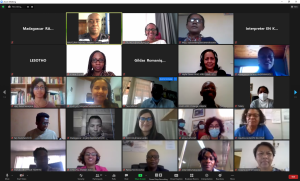Raising awareness of the African Region’s SRHR stakeholders on the WHO guidelines on self-care interventions for SRHR and Safe Abortion Care
To orient and update Regional SRHR stakeholders on the WHO Consolidated Guideline on Self-Care Interventions for Health and WHO guidelines on Safe Abortion Cares, the WHO Regional Office for Africa organized two rounds of webinars on 13 – 15 April and 20- 22 April 2021.
“The sexual and reproductive health and rights situation in the African Region continues to be a challenge. For example, the unmet need for family planning, remains too high, with more than 47 million women in the African region who are willing to stop or delay childbearing but are not using any method of contraception.” said Dr. Triphonie Nkurunziza, WHO AFRO Reproductive, Maternal and Healthy Ageing Team Lead In her opening remarks.
“In this context innovative approaches including self-care interventions are needed to maintain the continuity of care and assure women, girls and others have access to the services.” she added.
During these webinars, a global overview of the WHO consolidated guideline on self-care interventions for Sexual and Reproductive Health was provided by Dr. Chilanga Asmani, Technical Officer at WHO AFRO and Dr. Manjulaa Narasimhan, Scientist, WHO HQ Department of Sexual and Reproductive Health and Research.
In this session, updates on upcoming revisions of the guidelines were also provided. For the country level experience on self-care for SRHR interventions Dr. Olumuyiwa Ojo, Technical Officer, WHO Country Office Nigeria provided an overview of self-care implementation in Nigeria and shared the process followed by the country to develop and validate their national guideline on self-care for Sexual, Reproductive and Maternal Health. From Burkina Faso, Dr Oumarou Thiombiano, the Director of the African Institute for Health and Development (Institut Africain de Santé et Développement) shared the experience of implementing self-injection of DMPA sub-cutaneous contraception. This showcased how women can be empowered to take charge of their own contraception needs and achieve positive results.
For the WHO guidelines on safe abortion care, a global overview was provided by Dr. Hayfa Elamin, Technical Officer, WHO AFRO, Drs Bela Ganatra, Head of Unit, Prevention of Unsafe Abortion, WHO HQ and Dr Antonella Lavelanet, Medical Officer, Prevention of Unsafe Abortion Unit, WHO HQ. This session also provided participants with some updates on the ongoing revisions of this these guidelines. Benin experience on implementing the safe abortion guidelines was provided by Dr Souleymane Zan, Technical Officer, WHO Benin. Benin experienced focused on the process of national adaptation of the guidelines and follow up activities of developing job aides and health information notes for service providers together with incorporating the adapted recommendations in service providers pre-service training standards and modules. Dr. Belete Mihretu, Technical Officer, WHO South Africa shared experience of how the Choice on Termination of Pregnancy National Guidelines were used to develop an innovative comprehensive digital training package for SRHR interventions in South Africa. Dr. Alda Mahumana Govo, from the Women and Children Department, Ministry of Health, Mozambique provided a presentation on their experience of revising the national guidelines on safe abortion care following the revision of the country abortion law that provides less restrictions for women to access safe abortion services.
Facilitated discussion on self-care for SRHR in general and also specifically on self-care for abortion was led by Dr. Mekdes Daba, WHO HQ, Medical officer, Prevention of Unsafe Abortion Department of Sexual and Reproductive Health and Research, WHO HQ. This session allowed participants to reflect on what it actually means to implement these guidelines at the country level. The participants reflected on the facilitative factors as well as barriers that could hinder implementation particularly from a socio-cultural and legal/policy context. There was a consensus on the need to empower women to take control of the SRHR needs but however an enabling environment is an important prerequisite.
“As we are promoting a client/person centered approach for care, women should be at the center of every decision on abortion, be fully involved, total willingness on moving the process/es forward in any country and every service or intervention should be based on their needs” said a participant. While another participant argued: “They are the key player in the management of abortion as we need them to receive all vital information surrounding abortion, its management and complications including their role. Additionally, after understanding the concept and issues they need to consent and comply. Also, they need to be key advocates for policy change and roll-out/scale up of safe abortion services and care in the country.“
To strengthen awareness on the importance of building the capacity of women to meet their SRHR needs Dr. Muna Abdullah, Health System Specialist, UNFPA East Southern Africa Regional Office made a presentation titled ‘Expanding access to Sexual Reproductive Health coverage through active participation of women themselves’.
Each participating country developped action plans to introduce/scale up implementation of the guidelines as per country needs.
The meeting ended with final remarks from Dr. Leopold Ouedraogo, the Regional SRHR Advisor. “We have appreciated that participants have come up with relevant priority action plans and different steps for implementation of these action plans, these all are very important next steps to be considered.” he maintained.
Team Lead
Reproductive and Maternal Health
WHO Regional Office for Africa
Email : nkurunzizat [at] who.int
Medical Officer
Sexual and Reproductive Health
Email: ouedraogol [at] who.int
Tel: +242 06 671 28 28
Technical Officer,
Sexual and Reproductive Health and Rights
WHO Regional Office for Africa, IST for West and Central Africa
Email : asmanic [at] who.intdata-auth="NotApplicable" rel="noopener noreferrer" target="_blank"
Technical Officer,
Sexual and Reproductive Health and Rights
WHO Regional Office for Africa, IST for East and Southern Africa
Tel. +47 241 38407
Email: elaminha [at] who.intdata-auth="NotApplicable" rel="noopener noreferrer" target="_blank"
Chargée de communication en appui aux pays francophones
Bureau régional Afrique de l’OMS
Email : asekpon [at] who.int




